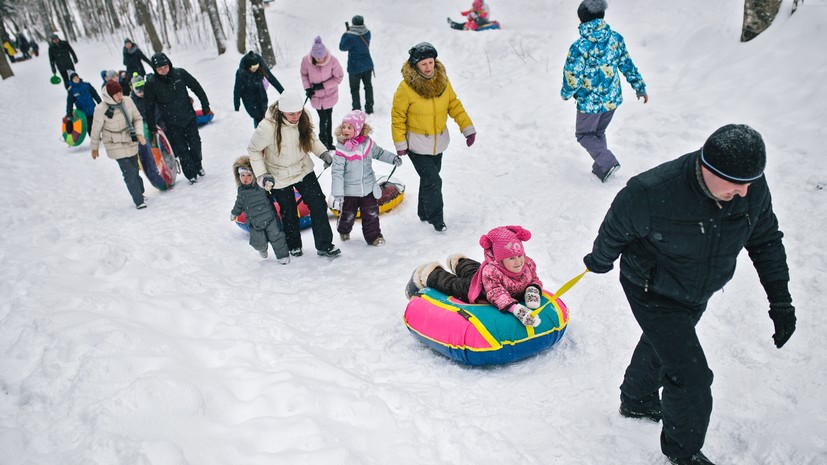From January 23, a single status for large families will be established throughout Russia.
A decree on this was signed by the country's President Vladimir Putin.
“It is important to revive the traditions of a large family... It is necessary to establish the status of a large family at the federal level - people are asking for this, this is a fair request and a fair demand - with appropriate benefits and support mechanisms that will be guaranteed, and guaranteed uniformly throughout the country,” he noted earlier head of state.
The new document defines a large family with three or more children.
The status is valid indefinitely, and its holders will begin to receive a single federal certificate and the necessary assistance from the state.
Social support itself will be provided until the eldest child turns 18 years old, or 23 years old if he is studying full-time.
“This is an important decision: large families are the present and future of our country.
Previously, there was no unified approach to determining their status.
Regions set these criteria independently.
Now families with three or more children will receive equal state support,” State Duma Chairman Vyacheslav Volodin commented on the Russian leader’s decision.
globallookpress.com
© Zamir Usmanov
In particular, the presidential decree guarantees: benefits and payments in connection with the birth and upbringing of children, support measures in the labor sphere, early retirement for the mother, vocational training for parents and the opportunity to receive additional education.
Also, citizens with many children will be entitled to free visits to museums, parks and exhibitions, regardless of their place of residence, in the manner and under the conditions established by the regions.
Along with this, Vladimir Putin recommended that the constituent entities of the Russian Federation provide a number of additional support measures and, for example, provide free prescription medications to children under six years of age, travel for students on public transport, school and sports uniforms.
Moreover, parents with three or more children will have to receive priority in admission to kindergartens and in receiving assistance under the social contract, as well as assistance in improving living conditions and benefits for housing and utility bills of at least 30% of the total cost of services.
According to the decree of the head of state, the Russian government will need to maintain a data bank about Russians with many children to record information about them and the support measures provided to them.
In addition, the Cabinet of Ministers has been instructed to monitor the socio-economic status of such parents in order to provide them with timely assistance.
In favor of fertility
In total, according to the Cabinet of Ministers, today in Russia there are about 24.5 million families, in which a total of 30 million children are being raised.
At the same time, the number of large families over the past five years has increased by about a third and now amounts to about 2.3 million.
“This is a very good indicator, but I want to tell you, it is not enough.
We must try to ensure that we have more such families and that we do everything possible to ensure that families in our big country live comfortably,” Deputy Prime Minister Tatyana Golikova said the day before during a speech at the “Russia” exhibition and forum.
globallookpress.com
© Alexander Legky
As Alexander Abramov, head of the laboratory for analysis of institutions and financial markets at the Institute of Applied Economic Research at RANEPA, told RT, a difficult demographic situation is currently emerging in Russia: the aging of the population is leading to a decrease in the number of working citizens.
In these conditions, the state is trying to provide all the necessary conditions to increase the birth rate in the country, the expert noted.
“For large families, financial assistance is extremely necessary.
Moreover, it is important that people know about the measures of such support.
It is no secret that with the birth of a child, people’s well-being begins to decline, and the birth of each subsequent one makes the situation more and more difficult.
Therefore, large families need to be helped constantly, especially in the current rather difficult time.
So the initiatives of the country’s leadership look quite logical,” Abramov added.
According to him, at the moment, some regions have the financial strength to help large families at a high level, while a number of other regions of the country do not have such opportunities, and therefore support measures remain insignificant.
The presidential decree, in turn, will have to correct this inequality, Abramov is sure.
A similar point of view was expressed in a conversation with RT by Svetlana Bessarab, a member of the State Duma Committee on Labor, Social Policy and Veterans Affairs.
“Moreover, previously in regions with high birth rates, parents were considered to have many children only after the birth of their fourth or fifth child.
Now all families with three or more children will receive this status.
It is important that, along with traditional support measures, new guarantees appear, including vocational training and retraining for in-demand professions, priority for concluding social contracts for the development of their business or subsidiary plot.
That is, people with many children are given the opportunity to earn a decent living and support their family,” the deputy explained.
Experts believe that due to the systematic increase in the number of large families in the country, after a certain time, more labor resources will begin to appear.
This, in turn, should have a positive impact on the long-term development and growth rate of the country’s economy, experts are sure.
“In addition, for further economic growth, it is important not only to have many people able to work, but also to increase labor productivity, as well as increase investment in fixed capital.
That is, in the future we need not just a new workforce, but also high personnel productivity for high-quality GDP growth,” concluded Alexander Abramov.

